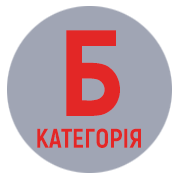REGARDING THE RELATIONSHIP BETWEEN THE CONCEPTS OF «OFFICIAL», «OFFICIAL OF A LEGAL ENTITY OF PUBLIC LAW» AND «SUBJECT OF DECLARATION» IN THE LAW
DOI:
https://doi.org/10.32843/juridica/2020.1.1Keywords:
«official», «official of a legal entity under public law», «subject of declaration»Abstract
The article considers the legal enshrinement in the regulations of domestic legislation and analyzes the features of the concepts «official», «official of a legal entity of public law» and «subject of declaration» in the context of defining the legal regime of these persons as subjects of criminal law, responsibility for committing official crimes. To define the concept of “official”, it is essential to rely on law enforcement practice which states that the main criterion of attributing of a person to a group of officials is his authorization with organizational-regulatory or administrative-economic functions. An official is always vested with the organizational-regulatory powers that authorize him to determine tasks and choose appropriate methods of activity, make management decisions, organize other persons to exercise the competence of the relevant body. Officials of state agencies, local self-government bodies, state institutions and enterprises, as well as non-governmental organizations, from the moment they have taken up a senior position, are endowed with power which provides an opportunity to perform organizational and regulatory functions. An official, compared to other employees, is entitled to ensure a centralized influence on the organizational structure, promote its integrity and coherence of the staff in performing tasks and functions defined in accordance with its competence. As for an official, he is considered to be so not only when he performs the relevant functions or carries out duties permanently but also when he does the above temporarily or due to special authority assuming that a competent body or a competent official assigned the mentioned functions or responsibilities to him. Thus, the official is endowed with a certain amount of powers and, within their limits, has the right to perform actions which result, change or terminate specific legal relations. In determining whether an official of a legal entity of public law is an officer of a legal entity of public law, it is necessary to take into account the scope and nature of his powers.
References
Вимоги щодо декларування майна, доходів, витрат і зобов’язань фінансового характеру та оприлюднення декларацій. URL: https://minjust.gov.ua./м/str_42543
Закон України «Про запобігання корупції» від 14.10.2014 № 1700-VII. URL: https://zakon.rada.gov.ua/laws/show/1700-18#Text
Конвенція Організації Об’єднаних Націй проти корупції, прийнята резолюцією 58/4 Генеральної Асамблеї ООН від 31жовтня 2003 року. URL: http://www.un.org/ru/documents/decl_conv/conventions/corruption.shtml
Кримінальний кодекс України: Закон від 05.04.2001 № 2341-III. URL: https://zakon.rada.gov.ua/laws/show/2341-14#Text
Постанова Пленуму Верховного Суду України від 26.04.2002 року № 5 «Про судову практику у справах про хабарництво». URL: https://zakon.rada.gov.ua/laws/show/v0005700-02#Text
Цивільний кодекс України: Закон від 16.01.2003 № 435-IV. URL: https://zakon.rada.gov.ua/laws/show/435-15#Text


